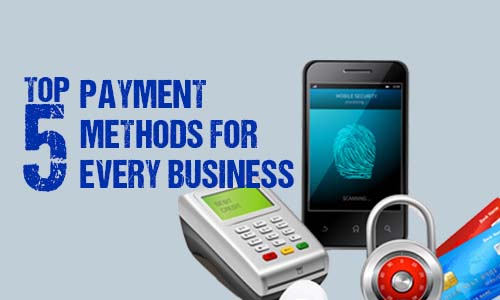
Top 5 Payment Methods for Every Business
- FazipayFinancialPOS
- May 31, 2023
- No Comment
- 98
A limited means of payment can hamper a business’s growth, revenue potential, and customer acquisition. At some point in business sales, cash was king, but that is no longer the case today because of the changes in the market.
Irrespective of the size of the business, you should diversify your payment methods to accommodate all kinds of customers and transactions. For example, you may limit your customers’ chances if you only collect cash and checks. Moreover, the digital age requires faster, easier, and more efficient means of payment.
According to Statista, the efficiency rate of e-payments transactions in Nigeria is still low at 1.16%. Payment by Cash is Nigeria’s most common payment method, especially for retail businesses. While over 122 million Nigerians are active bank customers, only 2.6% of the population have credit cards.
This article will focus on the top 5 payment methods businesses should explore to maximize profits. But first, let us consider why you need to offer multiple online payment methods.
Why Give Multiple Payment Methods for Your Business?
Modern customers prefer easy and efficient payment methods when buying from online and physical stores. While it is possible to retain a single payment method, it may reduce customer satisfaction and increase the bounce rate when purchasing a product or service.
Online payment gateways such as Paypal, Square, Interswitch, Apply Pay, Google Pay, and Stripe have provided customers access to paying without updating the information every time. Moreover, digital payments using mobile devices make online transactions seamless and practical.

Top 5 Payment Methods for Every Business in Nigeria
The effective payment methods in Nigeria are the ones that provide access and security to payment channels. Business owners need to provide a stress-free checkout process for customers and let them know the available options. Multiple payment methods are available to businesses in Nigeria, from cash to digital payments.
1. Cash and Cheques
Cash payments have been an age-long payment method for businesses and remain the top option in Nigeria. However, the CBN has provided cashless policies to enhance a move away from spending physical money. As a result, every kind of business can use digital payments, including retail and SMEs.
For instance, cashless payments are safer and more convenient for account management. Meanwhile, payment by cheque is declining as digital payment is becoming more prominent except for large business corporations.
2. Online Payment Gateways
One of the peculiar payment methods for businesses is online payment gateways. To integrate with this option, you may need to partner with a payment service company such as Infibranches.
This company offers a Single Point of Integration (SPOI) that makes direct payment collection easy for businesses. You can also collect payments via apps or POS services by integrating the price and payment structures.
3. Debit or Credit Card
Debit cards are helpful in almost all e-payment methods, including ATMs, POS, web, and other digital payment methods. However, many retail transactions involve using debit or credit cards. Therefore, as a business owner, you may lose an opportunity to make huge sales.
Moreover, using a card as a payment option greatly benefits the business and the customers. Some benefits include a fast checkout process for retail transactions, which favors mobile banking, while companies can now serve a broader range of demography.
4. Bank-to-Bank Transfer
A business can also make payments to other companies via a direct bank-to-bank transfer using a secure network. Like other payment methods, bank transfers also comply with the rules of financial security. It could involve the use of specialized payment links.
One unique benefit of this method is that it allows a one-off or recurring payment for continuous transactions. In addition, the customer could avoid high transaction fees and the high payment failure rate often associated with card payments.
In addition, bank-to-bank transfers also allow scheduled payments for specific dates, eliminating the risk of late payments.
5. Mobile Wallet
Mobile or digital wallets have also been growing as a payment method for small businesses. Mainly, service-oriented companies and small start-ups can provide payments through banking apps. In this case, a business must use a Point-of-Sale (POS) system.
The POS system stores clients’ details and issues instant receipts to customers. There are also contact and non-contact payment methods for digital payments. However, this payment method may attract certain charges, which is why businesses must find a low-charge payment service provider.
6. Email invoicing
We decided to add one extra payment method: email invoicing. You can collect payments for your product or services via email invoices. This method is suitable for independent and corporate service providers. can use email invoicing.
The service provider can include a direct payment link in the email or create a digital invoice that can link to the payment gateway. This payment method is also essential and beneficial in that the payment request can be completed ahead of the project, saving time.
Similarly, you can create an automated system to complete and submit invoices to receive payments and issue appropriate receipts. However, the limitation of this payment method is that it requires manual action by the payee to take action. As a result, payment may be delayed due to the human factor.
In conclusion, the five payment methods above are the best ways to ensure no lag in the process. The first process is to identify which of these processes works best for your kind of business and how often you are required to use the payment method. In the end, you can improve your overall business income by providing multiple and effective payment methods.

